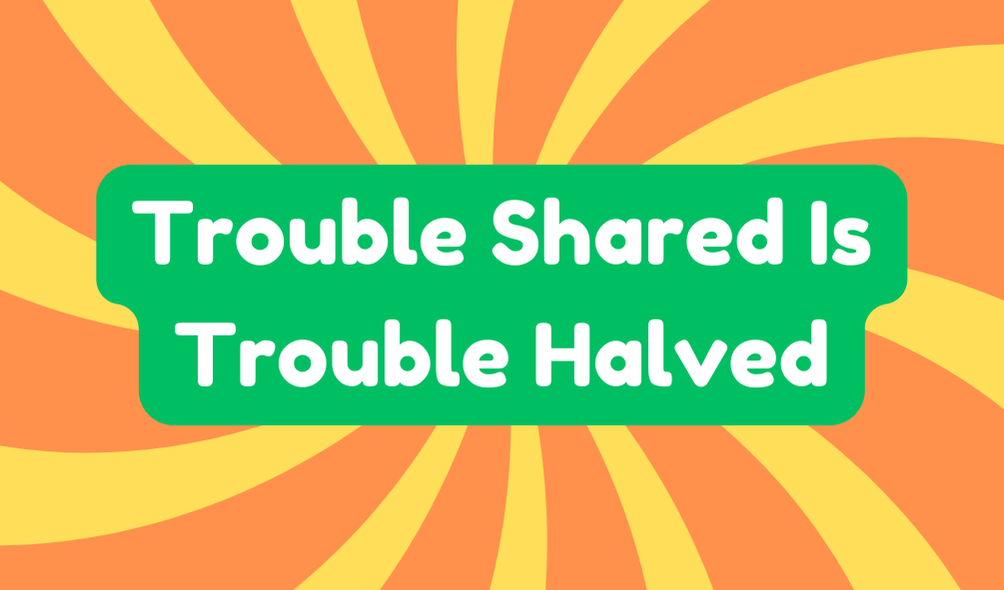The phrase "trouble shared is trouble halved" emphasizes the value of discussing challenges with others. This concept suggests that verbalizing our problems can considerably lighten emotional burdens. While it encourages openness and community support, it's vital to approach this notion critically. Simply sharing does not solve deeper issues; the quality of the support matters. Modern society often grapples with mental health challenges and isolation, making such conversations increasingly relevant. Building connections through meaningful dialogues can foster healing, but understanding the complexity of these interactions is important. Exploring the nuances of this idea reveals more about its practical applications and implications.
Synonyms
At its core, several synonymous expressions capture the spirit of the phrase "a trouble shared is a trouble halved." Variants such as "a problem shared is a problem halved" and "a worry shared is a worry halved" effectively communicate the same underlying idea: that discussing one's challenges can lighten the emotional load. Each expression exemplifies the potential for problem reduction through the act of sharing. Consider these points:
- Community Building: Strengthening bonds through shared experiences.
- Enhanced Solutions: Collective brainstorming often leads to innovative resolutions.
- Emotional Support: Counsel from trusted circles can fortify resilience.
- Empowered Communication: Fostering openness encourages proactive discussions about feelings.
In a world increasingly focused on innovation, these timeless expressions remind us that collaborative dialogue remains essential for overcoming life's hurdles.
Example of Sentences
Sharing one's troubles can often pave the way for clarity and relief, as evidenced by various illustrative sentences. Consider the impact of these scenarios:
- "Don't hesitate to share your problems with me; a problem shared is a problem halved."
- "Sara should confide in someone about her struggles; it may ease her mental health challenges."
- "The best option is to express feelings to a mother, enhancing emotional support and understanding."
- "A psychiatrist can assist Lidia with trauma recovery, emphasizing the importance of sharing burdens."
These examples underscore a pivotal truth: discussing issues not only mitigates personal burdens but also nurtures mental health. The essence of these sentences highlights the necessity of openness, challenging the stigma surrounding seeking help.
Origin
The origins of the phrase "a trouble shared is a trouble halved" remain somewhat ambiguous, yet its meaning resonates universally. While its historical context is unclear, the phrase underlines a cultural significance that transcends geographical boundaries. It suggests that discussing personal burdens fosters connection and support, echoing sentiments found in various cultures. However, one may wonder why sharing burdens is often portrayed as a simple solution. Is it sufficient to merely express one's troubles, or does this phrase oversimplify deeper issues? While the act of sharing certainly lightens the emotional load, it is essential to recognize the complexities involved in interpersonal relationships and the multifaceted nature of human experience. Ultimately, promoting dialogue can be a powerful tool in personal and communal healing.
Collocations
Understanding the importance of interpersonal communication can enhance the effectiveness of the phrase "a trouble shared is a trouble halved." Collocations related to this expression often highlight specific verbs, nouns, and adjectives that enhance its meaning and practical application. Recognizing these connections can foster innovation in emotional support and burden sharing, which are essential in managing life's challenges. Consider the following collocations:
- Share burdens – Actively reducing mental load.
- Seek support – Proactively identifying reliable allies.
- Express feelings – Transparently communicating emotional states.
- Build connections – Strengthening relationships through mutual understanding.
How to Use in Everyday Language
Utilizing the phrase "a trouble shared is a trouble halved" effectively in everyday language can foster open communication and emotional support among individuals. To integrate this saying into daily interactions, it is crucial to adopt proactive communication strategies. Encourage discussions with friends or family about challenges, thereby creating an environment that values transparency. Rather than keeping worries bottled up, emphasizing shared burdens during conversations leads to solutions and personal growth. However, one should remain realistic: while sharing can alleviate some weight, it does not eliminate the problem entirely. Consequently, combining open dialogue with actionable steps further enhances emotional support. By applying this phrase thoughtfully, individuals can catalyze meaningful connections and navigate life's difficulties with resilience.
Why Is It Still Relevant Today?
In contemporary society, the phrase "a trouble shared is a trouble halved" remains profoundly relevant, as it encapsulates a fundamental aspect of human interaction: the need for connection and support during challenging times. In an era marked by isolation and mental health concerns, modern friendships often rely on open dialogue. Sharing burdens fosters emotional resilience, allowing individuals to confront challenges with collective strength. While some may dismiss this notion as simplistic, it underscores an essential truth: vulnerability can lead to profound healing. By recognizing the power of shared experiences, we not only validate our struggles but also cultivate deeper connections. As technology evolves, so too should our commitment to meaningful conversations, ensuring that emotional support persists as a cornerstone of our relationships.
Frequently Asked Questions
To find a trustworthy individual for sharing troubles, evaluate potential candidates based on trustworthiness criteria, such as reliability and discretion. Prioritize effective communication, fostering a safe environment conducive to open dialogue and mutual understanding.
What Should I Do if I Feel Alone in My Struggles?
If you feel alone in your struggles, seek peer support through community groups, engage in emotional expression by journaling, and explore innovative platforms that foster connection, ultimately transforming isolation into shared understanding and support.
Are There Cultural Differences in Sharing Burdens?
Cultural perspectives on burden sharing vary considerably; some societies prioritize communal support and open dialogue, while others favor individualism and self-reliance. Understanding these differences can foster innovation in collaborative problem-solving and mental health support initiatives.
How Can Sharing Problems Improve Mental Health?
Sharing problems greatly enhances mental health by fostering emotional benefits and strengthening support systems. Engaging in open dialogue reduces anxiety, promotes problem-solving, and cultivates resilience, ultimately leading to healthier coping mechanisms and improved overall well-being.
What Professional Resources Are Available for Sharing Concerns?
In the labyrinthine journey of personal turmoil, professional counseling offers a beacon of hope. Online therapy platforms further illuminate this path, providing innovative avenues for individuals to share concerns, fostering resilience and facilitating profound emotional healing.







